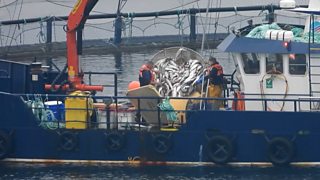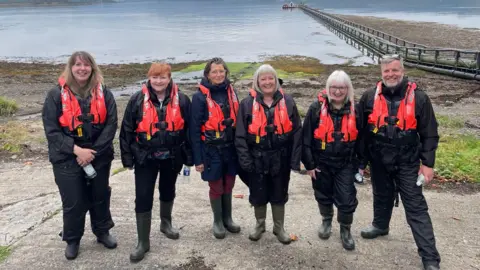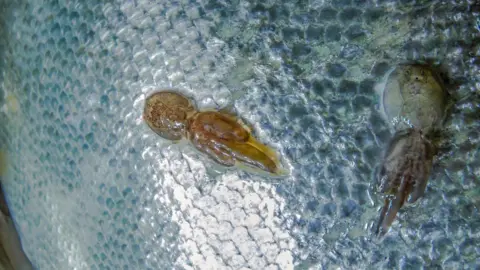Fish farm 'removed tonnes of dead salmon' before visit by MSPs
Kevin Keane
BBC Scotland's environment correspondent

Video shows 'tonnes of dead salmon' being removed before MSP visit
An animal welfare charity says it filmed tonnes of dead and dying salmon being removed from a fish farm just hours before MSPs visited the site.
Members of the Scottish Parliament's rural affairs committee visited Dunstaffnage fish farm near Oban on Monday for a fact-finding mission.
The committee is holding a follow-up inquiry into how the sector has changed since a damning report in 2018 raised environmental concerns.
Animal Equality UK has accused the fish farm operator of trying to paint a "wholly inaccurate" picture of the industry but Scottish Sea Farms insists the footage shows "routine" operations.
 Scottish Parliament
Scottish ParliamentSix members of the rural economy and islands committee visited the salmon farm
Representatives from the salmon farming industry are due to appear before the committee next week.
A spokesperson for the committee said it had heard concerns about fish mortality on salmon farms during its inquiry, and added: "This footage raises further questions for the committee."
BBC Scotland News understands that the removal of the fish on Monday morning was not discussed with MSPs.
Abigail Penny, executive director at Animal Equality UK, has accused the industry of wanting to "hide the truth" rather than tackle the serious issues it faces.
She says the industry still does not have a handle on the parasites and diseases "running rampant" through fish farms, which she believes are too densely stocked.
She added: "We urge the committee to see the industry for what it truly is: deceptive and deadly."
Farmed salmon production drops by a fifth
New strategy aims to calm waters around fish farming
Zones planned to protect wild salmon from sea lice
Scottish Sea Farms, which operates the site, insisted the footage showed teams following standard operating procedures by regularly removing dead or dying fish.
It said the number of fish removed each time would vary between pens and from day to day.
But it insisted it had "categorically not" had a mass mortality event.
The company also said it had engaged in a "full and open discussion" with MSPs during their visit.
Head of fish health and welfare, Dr Ralph Bickerdike, said: "Contrary to the claims made by Animal Equality UK, this is an essential part of our duty of care and something we do daily wherever conditions allow, whether we have a farm visit scheduled or not."

Images/Naturediver
Parasitic sea lice have been a huge problem for the industry for many years
Scottish salmon is the UK's biggest food export, worth £578m in 2022.
But the number of fish dying on farms has been increasing, with a record 17 million salmon deaths reported in Scotland last year.
Warm sea temperatures have led to a significant increase in micro-jellyfish which cause harm to farmed salmon.
There are also long-standing concerns around parasitic sea lice and the use of chemical treatments in open waters.
In 2018, Holyrood's environment committee concluded that Scotland's marine ecosystem faced "irrecoverable damage" from an expansion in fish farming.
A report by the regulator Sepa, in the same year, found that almost one in five salmon farms in Scotland failed to meet statutory environmental standards.
Another report, by the Scottish parliament's rural economy committee, made 65 recommendations for improvement but stopped short of backing a moratorium on new fish farms.
The current inquiry is examining to what extent those recommendations have been implemented.
Parasitic sea lice have been a huge problem for the industry for many years
Scottish salmon is the UK's biggest food export, worth £578m in 2022.
But the number of fish dying on farms has been increasing, with a record 17 million salmon deaths reported in Scotland last year.
Warm sea temperatures have led to a significant increase in micro-jellyfish which cause harm to farmed salmon.
There are also long-standing concerns around parasitic sea lice and the use of chemical treatments in open waters.
In 2018, Holyrood's environment committee concluded that Scotland's marine ecosystem faced "irrecoverable damage" from an expansion in fish farming.
A report by the regulator Sepa, in the same year, found that almost one in five salmon farms in Scotland failed to meet statutory environmental standards.
Another report, by the Scottish parliament's rural economy committee, made 65 recommendations for improvement but stopped short of backing a moratorium on new fish farms.
The current inquiry is examining to what extent those recommendations have been implemented.
No comments:
Post a Comment